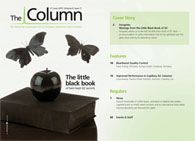Jitterbugs
Peas, beans and some other plant seeds contain proteins, called globulins, which have been shown to act as a defence against insects and other herbivores. Coffee beans contain large amounts of globulins, so scientists in Brazil studied the beans to assess their potential for warding off insects.
Peas, beans and some other plant seeds contain proteins, called globulins, which have been shown to act as a defence against insects and other herbivores. Coffee beans contain large amounts of globulins, so scientists in Brazil studied the beans to assess their potential for warding off insects.
Their study, published in the Journal of Agricultural and Food Chemistry,1 tested the proteins against cowpea weevil larva. Proteins from the seeds of two coffee species were characterized and isolated by gel filtration and reversed-phase chromatography, before being fed to the weevil larva. The coffee proteins killed up to half of the insects and significantly reduced the larval weight relative to the control group confirming the insecticidal effect.
Next, the researchers hope to isolate the genes responsible for producing these proteins and insert them into tobacco for further insect tests. It is suggested that in the future similar gene insertions could be used in other food crops, such as grains, to allow those plants to produce their own insecticide.
M.B. Coelho et al., J. Agric. Food Chem., 58(5), 3050–3055 (2010).
This story originally appeared in The Column. Click here to view that issue.
Silvia Radenkovic on Building Connections in the Scientific Community
April 11th 2025In the second part of our conversation with Silvia Radenkovic, she shares insights into her involvement in scientific organizations and offers advice for young scientists looking to engage more in scientific organizations.
Analytical Challenges in Measuring Migration from Food Contact Materials
November 2nd 2015Food contact materials contain low molecular weight additives and processing aids which can migrate into foods leading to trace levels of contamination. Food safety is ensured through regulations, comprising compositional controls and migration limits, which present a significant analytical challenge to the food industry to ensure compliance and demonstrate due diligence. Of the various analytical approaches, LC-MS/MS has proved to be an essential tool in monitoring migration of target compounds into foods, and more sophisticated approaches such as LC-high resolution MS (Orbitrap) are being increasingly used for untargeted analysis to monitor non-intentionally added substances. This podcast will provide an overview to this area, illustrated with various applications showing current approaches being employed.
Regulatory Deadlines and Supply Chain Challenges Take Center Stage in Nitrosamine Discussion
April 10th 2025During an LCGC International peer exchange, Aloka Srinivasan, Mayank Bhanti, and Amber Burch discussed the regulatory deadlines and supply chain challenges that come with nitrosamine analysis.
Removing Double-Stranded RNA Impurities Using Chromatography
April 8th 2025Researchers from Agency for Science, Technology and Research in Singapore recently published a review article exploring how chromatography can be used to remove double-stranded RNA impurities during mRNA therapeutics production.










